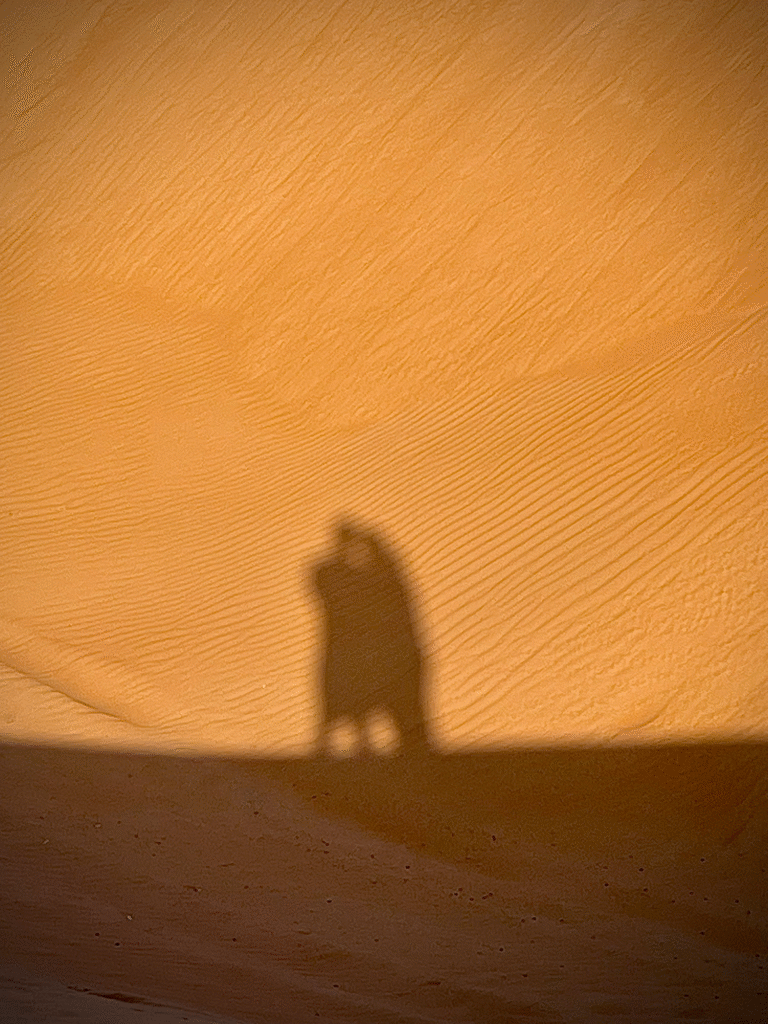By Fran Blake

The letters are piled neatly beside each other. A word is made. A picture comes into focus in the small Moroccan hotel room where you are the only guests, as you sit trying to create crossword puzzles together. You’ll wonder about your fascination with words. With them, one keeps trying, supposing, and there’s never a definite image no matter how hard one looks.
Sometimes you’ll sit for hours devising them, filling in the small squares. Sometimes you call out to one other for help. You’re careful to rely on one another, still, to make sure you’re the people you once were.
There will be no turning back when you no longer recognize one another.
You hope to transform, emerge as new human beings with a greater understanding of the world, with a greater ability to help others, without an unraveling of your collected years. Without a universal memory, there’s no past, and then, there’s no existence. One just wanders around, one of the lost caught in a space warp, forever friendless and seeking. You have come to Morocco for something, and change might be painful.
When the snake sheds its skin, at least there is tangible proof of a prior existence.
You’ll keep seeing snakes, not knowing if they’re real as you cross the Atlas Mountains to get from Marrakesh to the Sahara. The landscape changes in the mountains. In the summer, there’s lush greenery and in the winter, there’s snow. It’s this snow that melts and drips down to irrigate the oasis lands, but when the snow flows rather than drips, the dried riverbed fills quickly. Sometimes the water covers the small bridges. Sometimes it rushes forward and drowns people, donkeys and submerges cars.
Seasons change without warning.
You can see the objects bouncing around in the sweeping current struggling for survival, but beneath there are large rocks one is bound to hit. There are signs on some of the winding roads on the low desert, pictures of cars splashing through water. The signs seem a mockery both because in the day it’s so hot and the landscape so brittle one cannot imagine water freely running through this land and because, though the people of the Sahara know there are certain times during which floods should occur, they are, in reality, somewhat unpredictable.
Whole villages have been washed away by these occurrences.
Along the coast near Essaouira or Mohammedia, the ocean sits there. Within a certain spot, it’s wild but except for its natural tides, you know it will stay in its place. The women carrying their baskets of dough to the bread ovens will not be carried away in an onrush of water. The houses will not be broken to bits to float unimpeded like glass bottles filled with ancient scripts. For here is an ancient civilization. If pieces of it were to float up to the Long Island shore across the Atlantic, archeologists would think a long undiscovered people had come to light.
Where you have come to light.
Morocco is a world of shadows, existing only because of the once scorching sun. Walking through the medina, the shadows of arches and doorways, the shadows of figures beneath djellabas are so convincing, one gets lost. It’s like the magic mirror maze in a funhouse where you constantly discover you’ve gotten nowhere.
Before seeing your reflection
staring back.
In the desert, gaping crevices appear and disappear as you come upon them. The jumping light creates silvery surfaces that appear to be ripples of water. At night, you try to remember what was there, beneath the sunlight. No matter how close you get to an object, you cannot define it.
The change in appearance is
so severe that memory fades.
Here, in this place of refuge, people remain silent as they ride their donkeys, as they carry their water jugs on their heads. A simmering quiet fills the air as their straw baskets are filled with vegetables, as the smoke of kif fills the air, obliterating all thought.

Fran Blake has traveled extensively to study world cultures. She is especially interested in memories: how they are stored, reconfigured and accessed. This has led her to specialize in working with persons who have undergone trauma due to political upheaval and natural disasters. Fran has published widely.